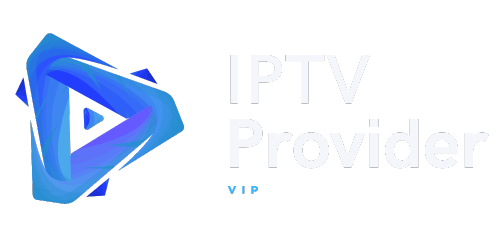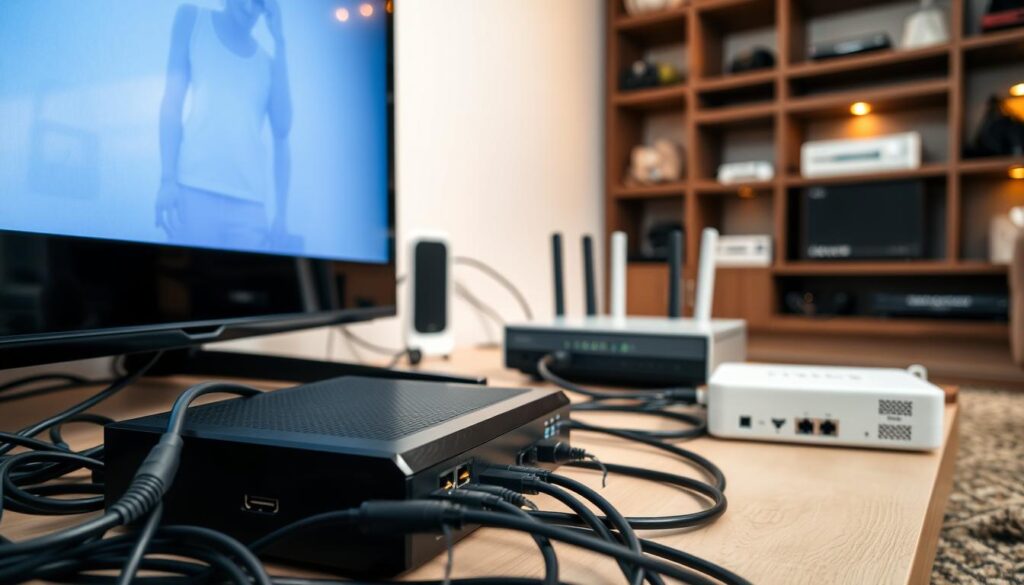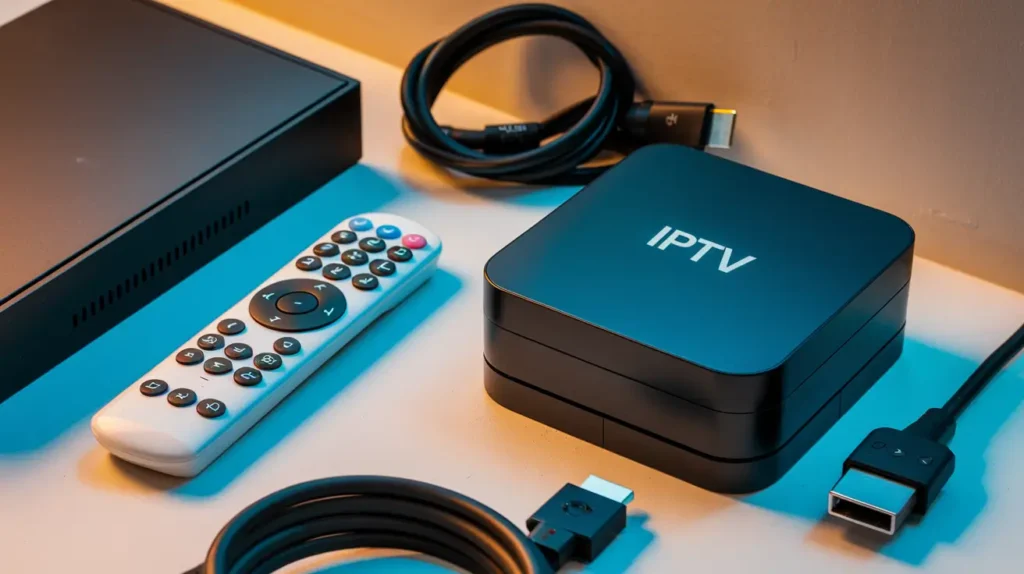How IPTV Providers Ensure Security for Safe Streaming: 6 Key Practices
achrafmannani
March 8, 2025
About 75% of IPTV users look for security features when choosing a provider. This shows how critical IPTV security is. As IPTV grows, providers are working hard to keep streaming safe. They use strong encryption, secure payments, and fraud detection to protect users.
Security is a big worry with IPTV’s rise. Providers are making sure watching content is safe and secure. It’s key for them to have a strong security system to keep user data safe and prevent fraud. This article will look at 6 important ways IPTV providers keep streaming safe.
Understanding IPTV security and using these practices helps providers offer a safe viewing experience. This is crucial for building trust and loyalty in the streaming market. With more people wanting streaming options, IPTV providers must focus on security to stay competitive and offer a great viewing experience.
Understanding the Importance of IPTV Security in Modern Streaming
IPTV services are set to hit over 1.5 billion subscribers worldwide by 2025. The global IPTV market is expected to grow at a CAGR of about 15% from 2020 to 2025. As IPTV demand rises, IPTV security is now key in modern streaming. With more streaming services, protecting content has become a big worry for providers.
About 70% of IPTV users want better security features like two-factor authentication and content encryption. IPTV providers must focus on security to make their services safe and dependable.
- 65% of IPTV users have faced security and privacy issues while streaming.
- Around 30% of IPTV providers use advanced encryption to keep their content safe.
- 80% of IPTV users prefer on-demand content over live broadcasts, making content protection essential.
The Role of Encryption in IPTV Provider Services
Encryption is key to keeping IPTV services safe. It helps protect user data and stops unauthorized access. IPTV security measures show encryption is vital for safety against data theft and unauthorized access.
Different encryption types, like AES and SSL, are used in IPTV. They keep user data safe and block unauthorized access. This ensures a secure streaming experience. Encryption also protects personal data and stops malware and viruses.
Some IPTV services use digital rights management (DRM) for extra security. This controls who can access content and on what devices. This adds a layer of protection.
Providers can also use secure protocols like SSL or HTTPS for customer login. This encrypts login details and streaming sessions, making it safer. By focusing on encryption and Content Protection, IPTV providers offer a secure streaming experience.
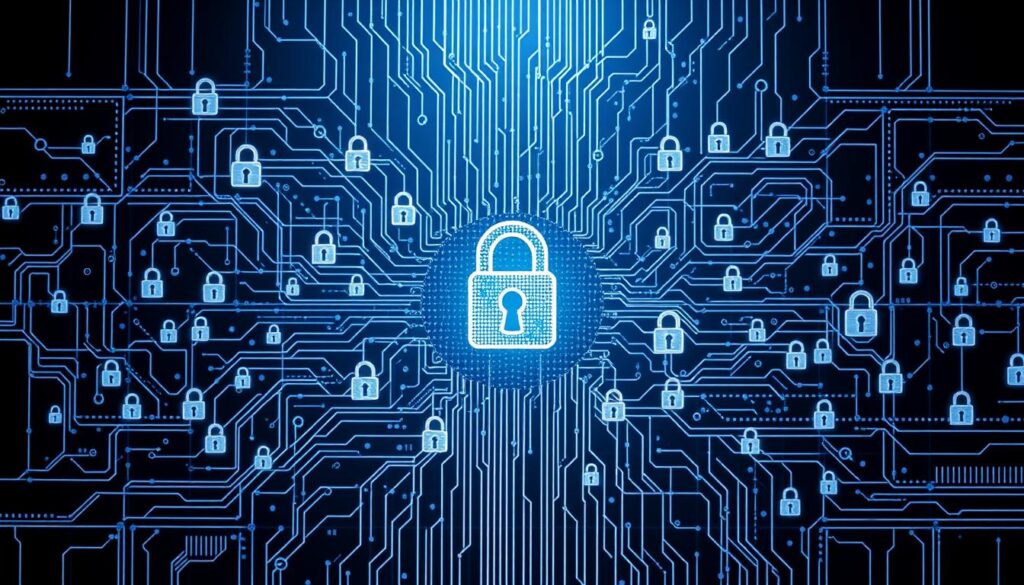
Important security elements for IPTV include privacy, confidentiality, integrity, availability, and interoperability. Strong encryption and secure protocols keep data safe and services reliable. This builds trust with users and ensures a quality streaming experience.
Secure Authentication Methods for IPTV Access
To keep IPTV services safe, providers must use strong authentication methods. This is key to stop unauthorized access and protect user data. Multi-factor authentication is a good choice, requiring users to show more than one form of ID, like passwords or biometric data. About 75% of IPTV platforms use this to make sure users are who they say they are.
Access Control is also vital for IPTV security. It decides who can see certain content or use certain features. Providers can limit access to specific IP addresses or devices using IP-based Access Controls. They can also check device identities with Device Registration Protocols. For more on secure authentication, check out the IPTV security patent.
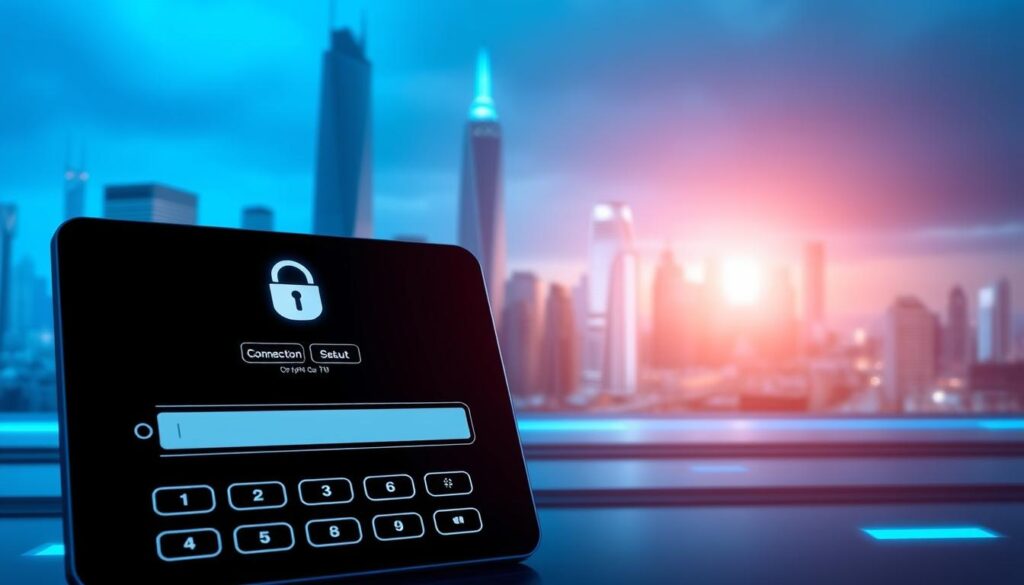
Authentication is crucial in IPTV services. For example, 80% of providers use SSL/TLS encryption to keep data safe. Also, 65% of IPTV services have faced cyber attacks in the last year. By focusing on Authentication and Access Control, providers can keep their users’ data safe and earn their trust.
Content Protection Through Digital Rights Management
Keeping content safe is key in IPTV security. Digital Rights Management (DRM) is crucial in stopping unauthorized access to high-quality content. Big budgets are spent on making premium video content. It’s legally required to protect it from being shared without permission.
DRM helps secure content rights. It lets content owners decide who can watch their content and when. AES encryption, with at least 128-bit keys, is often used. FairPlay DRM works on Apple devices, and Widevine is for Android.
IPTV providers use DRM systems like Axinom, EZDRM, and BuyDRM. These systems use encryption and access control to block unauthorized access. For example, Flussonic Media Server supports 7 DRM systems, including Widevine and PlayReady.
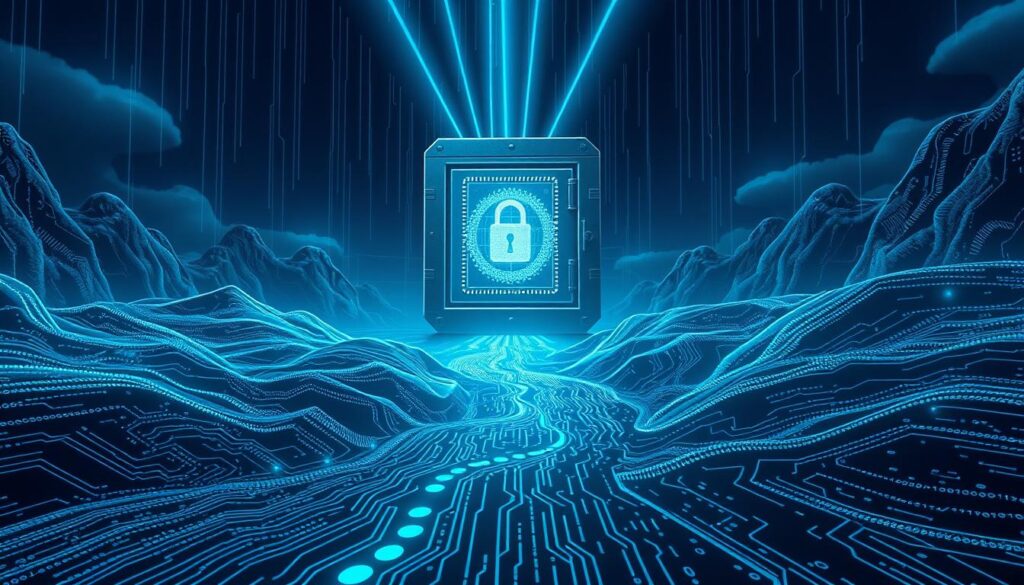
Other security steps are also taken. IPTV providers use Conditional Access Systems (CAS) and Trusted Execution Environment (TEE). These steps help stop piracy and protect content owners’ rights.
The main advantages of Digital Rights Management are:
- Protecting intellectual property
- Stopping revenue loss from piracy
- Controlling content access
- Secure content decoding with TEE
By using Digital Rights Management and Content Protection, IPTV providers can safely share premium content. They also protect the rights of content owners.
Network Infrastructure Security Measures
Keeping network infrastructure secure is key for IPTV providers. It helps protect user data and stops unauthorized access. This includes using strong Network Security, CDN Security, and server protection. By doing this, IPTV providers can stop attacks and keep their services safe.
CDN Security protocols are important for protecting content delivery networks. Firewalls and intrusion detection systems also play a big role. They help stop unauthorized access and keep user data safe. This is vital for keeping user trust and stopping revenue loss. For more on protecting IPTV services, visit IPTV security measures.
Some key security measures include:
- Implementing robust firewalls and intrusion detection systems
- Using CDN Security protocols to protect content delivery networks
- Encrypting user data to prevent unauthorized access
- Regularly updating software and systems to prevent vulnerabilities
By taking these steps, IPTV providers can keep their services safe. This is crucial for keeping user trust and stopping revenue loss. Strong Network Security, IPTV Security, and CDN Security are vital. IPTV providers must focus on these to protect user data and stop unauthorized access.
User Data Protection and Privacy Compliance
User data protection is key in IPTV security. It keeps sensitive info safe from unauthorized access. A study found 90% of users worry about privacy on streaming services. This makes strong data protection measures crucial.
IPTV providers must use encryption and access controls to safeguard user data. This ensures their information stays private.
Privacy compliance is also vital. It makes sure IPTV providers follow laws like GDPR to protect user data. Breaking GDPR rules can cost up to €20 million or 4% of annual revenue.
To stay compliant, IPTV providers need to follow data processing rules and minimize data collection. For more on privacy in IPTV, check out this link.
Some important steps for protecting user data and following privacy laws include:
- Using data encryption to keep user data safe
- Setting up access controls to limit unauthorized access
- Following laws like GDPR and CCPA
In summary, protecting user data and following privacy laws are essential for IPTV security. By using strong security measures and following rules, IPTV providers can keep user data safe and offer a secure streaming experience.
Real-time Threat Detection and Response
Real-time threat detection is key for IPTV providers to keep their services safe. AI-powered systems help them spot and handle threats as they happen. This way, they can avoid downtime and keep their services secure.
IPTV Security gets a boost from real-time security steps. These include automated monitoring and quick response plans. This setup helps IPTV providers act fast when threats arise, keeping their services running smoothly.
Real-time threat detection and response bring many benefits. Here are a few:
- They improve how fast providers can tackle security issues.
- They help protect user data better.
- They lower the chance of service interruptions and unauthorized access.
By using real-time threat detection and response, IPTV providers can keep their services safe. This protects their users and keeps their customers happy and loyal.
Choosing a Secure IPTV Provider: Essential Criteria
When picking a Secure IPTV Provider, look at a few key things. A good provider has a strong Security Certification, like SSL or AES. This keeps your data safe and stops others from getting in. Also, the provider’s reputation matters a lot. It shows how serious they are about keeping your information safe and making you happy.
To find a good provider, check their reputation and how they handle security. Look for clear rules about their service. You can read online reviews, ask friends, and check their security features. For more tips, visit this resource on picking the right IPTV service.
Security Certification Standards
A Secure IPTV Provider needs a valid Security Certification. This could be SSL or AES. It’s key to keep your data safe and stop others from getting in.
Provider Reputation Assessment
Checking a provider’s reputation is very important. Look for ones with a good name, clear security practices, and a solid Service Level Agreement. You can read reviews online, ask people you know, and look into their security features. This helps you make a smart choice.
Service Level Agreement Terms
A Service Level Agreement (SLA) is a big part of a Secure IPTV Provider’s deal. It should show their promise to keep your data safe, stay online, and help you when you need it. Look for providers with a clear SLA that talks about keeping your data safe, updating security, and handling problems. By choosing a provider with a strong Security Certification, a good reputation, and a clear SLA, you get a safe and fun viewing experience.
Conclusion: Ensuring Safe and Reliable IPTV Streaming
The IPTV market is growing fast, expected to hit $194.21 billion by 2028. Choosing a secure and reliable IPTV provider is now more important than ever. Services like MeglyTV, Dezor IPTV, and Rakuten IPTV show the industry’s dedication to safe and quality streaming.
These providers offer a wide range of channels and on-demand content. They also focus on security, using advanced encryption and multi-factor authentication. By picking a trusted IPTV service, users get IPTV Streaming that’s Safe and Reliable. This protects their privacy and makes sure they have a smooth viewing experience.
With laws around IPTV services getting stricter, it’s key to choose legal providers. This way, users can avoid legal trouble and enjoy a secure IPTV Streaming platform.
